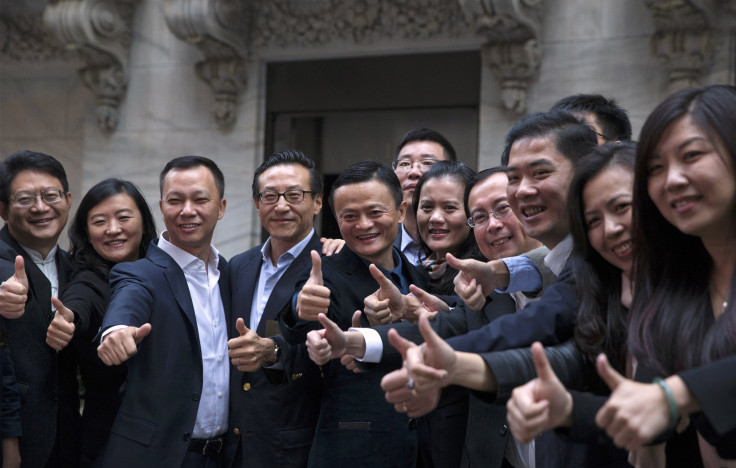Alibaba's Big Winners: Underwriting Banks, Jack Ma And NYSE

Now that the dust has cleared on the Alibaba Holdings Ltd. IPO, some perspective: the Chinese e-commerce giant is now worth $230 billion, making it the fourth-largest tech company in the world behind Apple, Google and Microsoft, in terms of market capitalization.
The public offering raised $21.8 billion for Alibaba, more than Visa's $17.8 billion in 2008 and more than Facebook's $16 billion in 2012. After briefly soaring close to $100 a share, the stock settled back in the $91 to $91 range and closed at $93.89, slightly higher than the $92.70 opening price, but up 38 percent from the IPO price of $68.
In other words, a pretty perfect debut for a little-understood company whose current business is almost entirely based in China, where it controls an estimated 80 percent of the e-commerce market. Given the 38 percent pop, one could argue the offering was underpriced, and that the owners of Alibaba -- namely Jack Ma and Yahoo -- sold it too cheaply.
"The selling shareholders left $5 billion on the table for other people to take," said Tim Loughran, professor of finance at the University of Notre Dame Mendoza College of Business. "All the institutions got that money; it's quite a transfer of wealth that happened there."
But given the company's complex ownership structure, that it's based in the Cayman Islands and that founder/chairman Jack Ma has a history of doing deals that intermingle his personal and Alibaba business, it was probably a wise move to price it conservatively. Also, Facebook's botched 2012 IPO still casts a shadow over the market and Nasdaq. In that IPO, the company attempted to squeeze every last dollar out of the offering and it backfired. A software glitch delayed trading, the stock fell and took more than a year to recover to its $38 debut price.
In that sense, the Alibaba IPO was another huge win for the New York Stock Exchange, which has now flawlessly handled two huge tech IPOs in a row: Twitter and now Alibaba. The NYSE has a manual process for reconciling pre-orders and because orders kept coming in higher, there was a two-hour delay at the open. “This is a huge deal and you want to get it right," said Glenn Carell, director at Barclays Capital and designated market maker for the IPO. "There’s no rush to open it."
If there are any losers in the deal, it's those who sold Alibaba at $68, namely Yahoo, which let $3 billion slip through its fingers. Yahoo walks away with $8.3 billion from the IPO, but now that's looking like a bad move; they could have made $11.3 billion.
Yahoo shares closed nearly 3 percent lower, despite the windfall. With a $42 billion market cap, Yahoo is being valued at little more than the sum of its Alibaba holdings and cash, not a ringing endorsement of CEO Marissa Mayer or of the company, which has seen its share of online ad spending -- a business it once dominated -- slip to 2.4 percent. Yahoo still has a chance to make money on Alibaba: it retained a 16.3 percent stake.
One could also say the same of Jack Ma, who sold his own holdings at $68, but in exchange he gets to preside over the successful IPO of his company, a pretty remarkable achievement given the obstacles, including navigating the variable interest entity he had to create to satisfy rules that require Chinese tech companies remain wholly-owned in China. He also comes away China's richest man worth $22 billion, according to Bloomberg, and he still has an 8 percent stake.
Another big winner is Softbank, which sold no shares and retained a 32.4 percent stake, now worth $74 billion. Softbank, which owns Sprint, will now have a huge war chest to invest in the wireless carrier, a distant third to Verizon and AT&T in the U.S. market. Softbank's Masayoshi Son invested $20 million in Alibaba at the height of the tech bubble in 2002 to help save the company; that stake is worth $55 billion today.
© Copyright IBTimes 2024. All rights reserved.






















